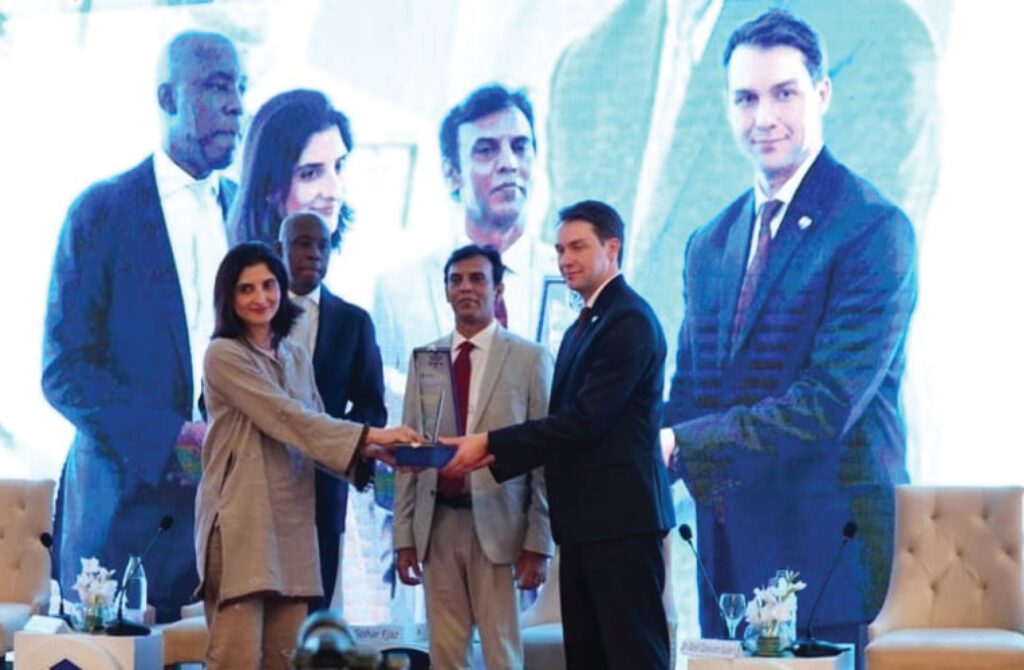Nestlé Pakistan celebrated a double victory at the Sustainability Awards hosted by the Sustainable Policy Development Institute (SDPI). The company secured top honors in the categories of Gender Equity and Agri Tech & Food Security for its outstanding initiatives under Creating Shared Value (CSV).
These initiatives included the Nestlé-BISP Rural Women Sales Program, which has empowered 2800 rural women financially, with a target to reach 5000 women by 2025. Additionally, Nestlé was recognized for its Smart Soil Moisture Sensors deployed on 548 acres, aiding farmers in detecting sub-soil moisture levels. This technological advancement aligns with Nestlé’s Waters Pledge, aiming to have a net positive impact on water usage by 2025.
The SDPI Sustainability Awards aimed to commend exemplary efforts and achievements in both the corporate sector and civil society organizations. The awards sought to recognize sustainability initiatives contributing to positive change and inspiring a collective commitment to a sustainable future. An independent panel of esteemed experts and thought leaders evaluated nominated case studies to determine the winners.
The awards ceremony took place during the 26th Sustainable Development Conference in Islamabad, where Nestlé and SDPI jointly hosted a plenary session on Climate Change & Food Security, exploring the theme “Light at the End of the Tunnel.”
Dr. Adil Najam, President WWF International, emphasized the urgent impact of climate change, stating that it is already affecting the present. He noted that 2023 is projected to be the hottest year on record and stressed the need for immediate action, highlighting regenerative agriculture as a beacon of hope.
Sheikh Waqar Ahmad, Head of Corporate Affairs & Sustainability at Nestlé Pakistan, expressed delight at the acknowledgment of their efforts towards communities and the planet. He emphasized Nestlé’s commitment to accelerating efforts to reduce greenhouse gas (GHG) emissions. Ahmad outlined Nestlé’s approach to achieving its Net Zero commitment by 2050, with a focus on scaling up regenerative agriculture.
He stated, “Regenerative Agriculture is one of our focus areas to reach our Net Zero commitment by 2050. Nestlé’s approach is centered around universal agronomical principles that help protect and restore natural resources – primarily soil, as well as water and biodiversity.”
Van Nguyen, Deputy Representative, UNDP Pakistan, shared insights from Vietnam, underscoring the deterioration of soil health due to three yearly crop cycles for rice. She emphasized the need for solutions that regenerate nature while making business sense, praising companies like Nestlé for leading the way in incorporating sustainability into their operations.
Dr. Abid Suleri, Executive Director of SDPI, moderated the discussion during the event. Dr. Masoud Al-Marri, Director General of the Islamic Organization of Food Security, stressed the importance of regenerative development for Islamic countries. He urged members of the Organisation of Islamic Cooperation (OIC) to leverage their individual strengths to improve food security collectively.
In conclusion, Nestlé Pakistan’s recognition at the SDPI Sustainability Awards reflects its commitment to sustainable practices, particularly in gender equity and agri tech & food security. The company’s initiatives align with broader environmental goals, including addressing climate change and achieving Net Zero emissions. The collaborative efforts showcased at the Sustainable Development Conference underscore the importance of private sector involvement in driving positive change for a sustainable future.
